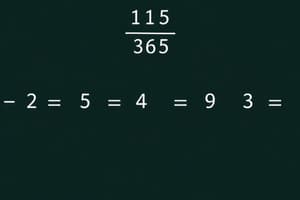Podcast
Questions and Answers
What is the definition of a rational number?
What is the definition of a rational number?
- A number that can be expressed as the quotient or fraction of two integers. (correct)
- A number that can be expressed as a fraction of two decimals.
- A number that can be expressed as a percentage.
- A number that can be expressed as a decimal.
What is the key characteristic of a proper fraction?
What is the key characteristic of a proper fraction?
- The denominator is zero.
- The numerator is less than the denominator. (correct)
- The numerator is greater than the denominator.
- The numerator is equal to the denominator.
What is the process of simplifying a fraction?
What is the process of simplifying a fraction?
- Dividing both numerator and denominator by their greatest common divisor (GCD). (correct)
- Multiplying both numerator and denominator by the same non-zero integer.
- Adding both numerator and denominator by the same non-zero integer.
- Subtracting both numerator and denominator by the same non-zero integer.
What is the result of multiplying two fractions?
What is the result of multiplying two fractions?
What is the purpose of finding a common denominator when adding or subtracting fractions?
What is the purpose of finding a common denominator when adding or subtracting fractions?
What is an equivalent fraction?
What is an equivalent fraction?
What is a characteristic of a mixed number?
What is a characteristic of a mixed number?
Which type of fraction has a numerator greater than or equal to the denominator?
Which type of fraction has a numerator greater than or equal to the denominator?
What is another name for a fraction that represents the same value as another fraction?
What is another name for a fraction that represents the same value as another fraction?
What type of decimal representation of a rational number repeats in a predictable pattern?
What type of decimal representation of a rational number repeats in a predictable pattern?
What is the result of converting a mixed number?
What is the result of converting a mixed number?
Flashcards are hidden until you start studying
Study Notes
Fractions as Rational Numbers
Definition:
- A rational number is a number that can be expressed as the quotient or fraction of two integers, i.e.,
a/bwhereaandbare integers andb≠ 0.
Key Characteristics:
- A fraction is a way to represent a rational number.
- A fraction consists of a numerator (top number) and a denominator (bottom number).
- The numerator and denominator are integers.
- The denominator cannot be zero.
Types of Fractions:
- Proper Fractions: The numerator is less than the denominator. (e.g., 1/2, 2/3)
- Improper Fractions: The numerator is greater than or equal to the denominator. (e.g., 3/2, 5/3)
- Mixed Numbers: A combination of a whole number and a proper fraction. (e.g., 2 1/2, 3 3/4)
Operations with Fractions:
- Addition and Subtraction: Require a common denominator.
- Multiplication: Multiply the numerators and denominators separately.
- Division: Invert the second fraction and then multiply.
Equivalent Fractions:
- Two fractions are equivalent if they have the same value.
- Can be obtained by multiplying or dividing both numerator and denominator by the same non-zero integer.
Simplifying Fractions:
- Divide both numerator and denominator by their greatest common divisor (GCD) to reduce a fraction to its simplest form.
- The simplest form is also known as the lowest terms.
Studying That Suits You
Use AI to generate personalized quizzes and flashcards to suit your learning preferences.




